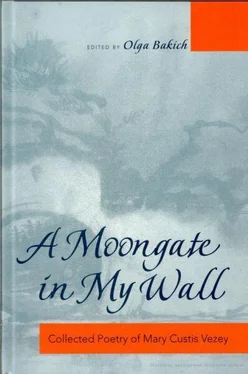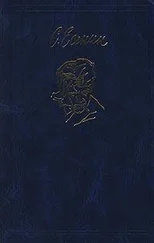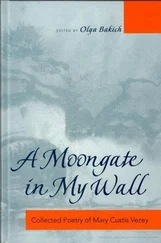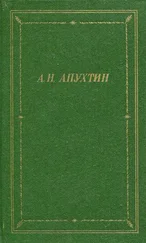A field of wild iris, that few people know about.
Around the bend of the Yalu
where the cliffs come close to the sparkling, chattering water,
suddenly you come to an open meadow
all purple with wild iris.
This meadow is like a green jade bowl
held by cliffs on three sides
with a grove of birches framing the river bank on the fourth.
Tie your horse to a birch trunk; let him nibble
on the sweet wild strawberries at his feet. Look:
What peace, what silence!
No one here to pluck these myriad blooms of deep purple,
more plentiful than the grass,
evidently so carefully tended
by a kind gardener.
548. «We sailed in a small river boat…»
A grey town, full of people very busy living.
We sailed in a small river boat
up the wide canal on the way to Zo-Ssu
one April day.
We passed through a town
and sailed under its bridge,
a high curved stone bridge,
linking two halves of the town.
The bridge was grey, like the walls
of the houses on either side,
but a very busy life
was evident everywhere,
people selling their wares and walking about the streets,
meeting above on the bridge to enjoy the sun and to engage in
conversation,
women washing their clothes at the edge of the stream below,
and several naked children, happy to be near water,
jumping in for a swim from the sampans anchored ashore.
549. «Ching-pu is an elderly man and all his chores are completed…»
Watching the river boats, having nothing else to do.
Ching-pu is an elderly man and all his chores are completed,
the tilling of fields, the raising of crops and of sons.
Ching-pu sits back on his heels on the sunny terraced knoll
smoking his long-stemmed pipe filled with bitter tobacco,
holding his slender pipe with withered yellow hand,
watching the river below hurrying round the bend,
watching the river sampans swiftly propelling themselves,
prow to the muddy current,
around the bend of the river,
towards the city beyond.
550. «Your gate is heavy, strong, and always barred…» [245] With a notation in the manuscript: «kai-meng-de' is Chinese for 'gatekeeper.»
Some are closed, and some are open;
I like the latter.
Your gate is heavy, strong, and always barred.
Its face is bright vermilion touched with brass.
A stout kai-meng-de guards it day and night
and just a chosen few may step inside.
But I prefer a moongate in my wail —
an open gate that has no use for locks.
Come, let us walk right through and see the pines
shedding dark needles on the moonlit steps!
551. «The white sands on the sloping shore of the river…»
He was almost as old as the river,
and he made more noise than the river itself
The white sands on the sloping shore of the river
lie silent, except for the lapping,
continuous lapping
of the yellow water
against the edge of the slope,
— the great mass of water
poured powerfully
down the deep trough of its old bed.
liven the water grasses,
crashing close to the current,
hold the wav'es of their surface
silently toward the sun.
Suddenly, a heavy splash disturbs the silence,
as the aged bulk of a huge river tortoise
turns swiftly
near the top of the yellow water,
to snatch a minnow.
552. «It was a lazy summer noon, as I sat in the stern of a flat-bottomed boat…» [246] Variant in the second line of the last stanza in the manuscript: «swiftly dividing the rushes with the sharp prow of your boat.» Sun-Hwa-kiang: Songhuajiang in the contemporary transcription, the Sungari River; see note on poem 327.
The blue parasol may have been becoming.
I do not know; I hope it was.
It was a lazy summer noon, as I sat in the stern of a flat-bottomed boat,
holding a blue parasol over my head and back.
My boatman rowed unhurriedly through the rushes,
the tall rushes crowding a narrow stream
across the Sung-Hwa-kiang.
I sat enjoying the blue of the sky,
the gold of the sun, the green of the grass and the ripples,
and I did not know whether I was pretty or not,
in my light summer gown,
against my light blue parasol —
I did not know whether I wras pretty or not,
I had not expected to meet you rowing towards me,
swiftly slicing the rushes with the sharp prow of your boat,
as you returned from your early morning fishing.
553. «He was a shepherd and he spent his hours…» [247] For the Western Hills see note on poem 471. «Have you had your rice?» i.e., «Have you eaten?» is a traditional polite enquiry in China.
A person encountered in the Western I lills near
Beitsing
He was a shepherd and he spent his hours
upon a hillside taking care of sheep.
He slept in his small hut of mud and straw
and ate his rice and sometimes drank his tea.
His hands were gnarled and grimy and his clothes
he hardly ever changed from month to month
for he was one of the unwashed who lived
so many li from rivers or a spring.
In early morning, when some stranger chanced,
dangling his dusty legs, on donkey back
to pass his hut, the friendly shepherd called
by way of greeting, —
«Have you had your rice?»
554. «At daybreak, as the skies lighten…»
Early morning in Beitsing: a sound fondly recalled.
At daybreak, as the skies lighten,
I roll up my window
and listen to my city.
The summer heat has not yet choked
the perfumed breath of night;
the dust in the street lies unwaken by pattering feet,
but the jingle of peddlers' wares
begins to reach my ears,
and then, what I await:
the whistling pigeon in the sky above Beitsing.
555. «When I was small I had a great vain dream…» [248] For Po Chu — yi see note on poem 527. The epigraph is taken from Bo Juyi's poem «Night Stop at Rongyang».
Only the waters of the Ch'in and Wei
Roll green and changeless, as in years
gone by.
Po Chu-i
When I was small I had a great vain dream,
a kind of game just with myself alone:
because the fathers of my little playmates
were wrapped far more than mine in worldly riches,
I played that one fine day I would invite them
to my poor shabby door
and they would knock
and through that creaking door in that grey alley,
awestruck, would tiptoe into sparkling halls
bedecked with wealth and of surpassing beauty.
This never happened, nor did I regret it
for still they came, and still we played together.
Now years have passed and we have ail been scattered.
And all these many years I have been toiling
and have it seems at last built quite a palace
behind that gate, and have assembled in it
great wealth and beauty far belittling those
which once I dreamed of as a foolish child;
Читать дальше










